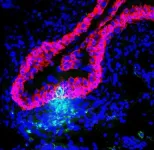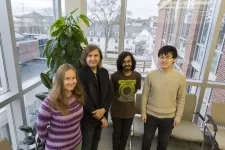(Press-News.org) In a new commentary for the journal Science, an associate vice president for research at The University of Texas at Arlington argues that emerging protein-based immunotherapies could lead to highly effective "off-the-shelf" cancer treatments for more patients.
Jon Weidanz, who also is a professor in the College of Nursing and Health Innovation at UTA, is the author of a perspective regarding the development of cancer immunotherapies.
His article, "Targeting cancer with bispecific antibodies," will appear in the March 5 edition of Science. It evaluates the findings of three studies by researchers at Johns Hopkins University and proposes that an emerging method of protein-based immunotherapy that targets commonly occurring mutations in cancer cells or neoantigens--mutated antigens produced by tumor cells--could lead to treatments that are effective for oncology patients.
Immunotherapy, a method to treat illness by stimulating a person's immune system, is a developing alternative to traditional cancer treatments.
"Up until recently patients were limited to four treatment options: surgery, radiation, chemotherapy and targeted therapy," Weidanz said. "However, the holy grail has always been to develop strategies that would harness the power of the immune system to attack and destroy the cancer. With recent breakthroughs in immuno-oncology along with the new findings being published in Science, it does appear we are closing in on cancer with new immunotherapies."
As medicine has advanced, immunologists have discovered ways to engineer a person's T-cells, the white blood cells that fight and kill infected cells, to recognize and target cancer cells and eliminate them from the body. This approach has led to exciting advances in the field and remission in some patients. However, more work is required to make this form of T-cell therapy more broadly accessible.
Alternatively, researchers have developed approaches that stimulate the immune system without removing T-cells from the body. These "off-the-shelf" protein-based treatments, known as bispecific T-cell engaging antibodies, have proven effective in treating patients with acute lymphoblastic leukemia, a type of blood cancer.
"The ideal is to create protein molecules that have two arms. One arm can recognize the cancer cell and bind to it. The other arm binds to T-cells," Weidanz said. "The protein drug then brings the T-cells into proximity with the tumor cells, which activate the T-cells to destroy the tumor cells."
These two-armed, or bispecific, proteins would avoid healthy cells while destroying cancer cells. Weidanz argues that this method of protein-based immunotherapy could make a difference. The key comes down to the unique targets expressed by the cancer cells that the bispecific protein drug recognizes. Bispecific antibodies could bind to particular neoantigen targets found on tumor cells and recruit T-cells to destroy the cancer.
"The beauty of bispecific proteins is that you could manufacture those proteins and put them on the shelf as an immunotherapy agent," Weidanz said. "If a doctor sees that a patient's cancer expresses the neoantigen target, they could be treated immediately. It's still a personalized medicine, but would not require engineering T-cells."
An expert in immunology, Weidanz has more than 30 years of experience in biotechnology research with an emphasis on immunotherapy, especially related to oncology and product development to diagnose and treat cancer. His research lab at UTA investigates how the immune system identifies malignant cells with the goal of designing treatments that boost immune cells' ability to destroy cancerous cells.
"Dr. Weidanz's substantial expertise in the field of immunology will lead us into the next generation of cancer management," said James Grover, interim vice president of research. "The developments of his lab and those of his many talented colleagues across the nation make this a pivotal moment in the history of a devastating disease."
Weidanz said immunotherapy holds the promise of transforming cancer into a more manageable condition with better prognoses for patients.
"We are getting to a point where we will be able to make cancer more of a chronic disease," Weidanz said. "Now, we look at five-year survival. Maybe we can start looking at 15- or 20-year survival readouts because we're able to manage the disease with immunotherapies that are being developed. It's a very exciting time."
INFORMATION:
In a study published online February 25, 2021 in The New England Journal of Medicine, a repurposed drug used to treat arthritis did not significantly improve the outcomes of patients with severe COVID-19 pneumonia.
Results of the Phase III clinical trial, conducted by an international team led by senior author Atul Malhotra, MD, research chief of pulmonary, critical care and sleep medicine at UC San Diego Health, found that tocilizumab did not significantly improve clinical status or mortality rate at 28 days for participants who received it compared to a placebo.
"Although our trial was negative based on primary outcomes, we did see some benefits, including an improvement in length of stay of eight days ...
In early 2020, daily life in Northern China slammed to a halt as the region entered a strict period of lockdown to slow the spread of COVID-19. Emissions from transportation and industry plummeted. Emissions of nitrogen oxides (NOx) from fossil fuels fell by 60 to 70 percent.
And yet, environmental researchers noticed that ground-level ozone pollution in Beijing and the Northern China Plain skyrocketed during this time period, despite the decrease of NOx, a component of ozone.
The region is no stranger to severe ozone pollution but until about five years ago, most ozone events occurred ...
CORVALLIS, Ore. - Oregon State University research has revealed a crucial mechanism behind one of humankind's most deadly physiological processes: the movement of malignant cells from one part of the body to another.
Published in the Proceedings of the National Academy of Sciences, the study led by OSU biophysicist Bo Sun shows the role that tissues' microscopic geometry plays in cancer metastasis, the internal spreading of the disease that's responsible for 95% of all cancer deaths.
To develop drugs that effectively combat metastasis, it's fundamentally important to understand what directs the metastatic process, Sun said.
"Our results show the level of tissue fiber alignment, particularly ...
A University of Melbourne led study has established how plants use their metabolism to tell time and know when to grow - a discovery that could help leverage growing crops in different environments, including different seasons, different latitudes or even in artificial environments and vertical gardens.
Published in the PNAS journal, Superoxide is promoted by sucrose and affects amplitude of circadian rhythms in the evening, details how plants use their metabolism to sense time at dusk and help conserve energy produced from sunlight during the day.
Lead ...
DURHAM, N.C. - Anyone who has ever developed a urinary tract infection (UTI) knows that it can be painful, pesky and persistent. UTIs have a high recurrence rate and primarily afflict women -- as many as 50% of women will experience at least one UTI during their lifetime.
However, what if patients could take a vaccine that would prevent future UTIs? In a March 1 study in the Proceedings of the National Academy of Sciences, Duke researchers describe a new vaccination strategy that they think could re-program the body to fight off the bacteria that cause urinary tract infections.
"Although several vaccines against UTIs have been investigated in clinical trials, they have so far had limited success," said Soman Abraham, Ph.D., Grace Kerby Distinguished Professor of Pathology, Immunology ...
A new study from Boston Children's Hospital and the Massachusetts Department of Health compared one of the latest rapid antigen tests for COVID-19 -- the Abbott BinaxNOW -- with a highly accurate PCR test in a high-volume, drive-thru testing environment. They found that the rapid test detected almost all adults who tested positive by PCR if they had had symptoms lasting seven days or less. In symptomatic children with less than seven days of symptoms, the test picked up about 85 percent of true positive cases.
But no matter the age, if the patient had high amounts of virus in their nose, the test caught it 99 percent of the time. It was also able to rule out COVID-19 ...
The human gut consists of a complex community of microbes that consume and secrete hundreds of small molecules--a phenomenon called cross-feeding. However, it is challenging to study these processes experimentally. A new study, published in END ...
Researchers from Skoltech and the University of Cambridge have shown that polaritons, the quirky particles that may end up running the quantum supercomputers of the future, can form structures behaving like molecules - and these "artificial molecules" can potentially be engineered on demand. The paper outlining these results was published in the journal Physical Review B Letters.
Polaritons are quantum particles that consist of a photon and an exciton, another quasiparticle, marrying light and matter in a curious union that opens up a multitude of possibilities in next-generation polaritonic devices. Alexander Johnston, Kirill Kalinin and Natalia Berloff, professor at the Skoltech Center for Photonics and Quantum Materials ...
A group of researchers representing four countries summed up the results of the Supertest, a large-scale study of the academic performance of engineering students in Russia, China, India, and the United States. It is the first study to track the progress of students in computer science and electrical engineering over the course of their studies with regard to their abilities in physics, mathematics, and critical thinking and compare the results among four countries. The article about study in Nature Human Behavior.
The HSE Institute of Education played a key role not only in collecting and analyzing data from Russia, ...
March 1, 2021 - Benign bone tumors may be present in nearly 20 percent of healthy children, based on a review of historical radiographs in The Journal of Bone & Joint Surgery. The journal is published in the Lippincott portfolio in partnership with Wolters Kluwer.
Although that may sound frightening, non-ossifying fibromas and other common benign bone tumors in symptom-free children are harmless and may resolve over time, reports the new study by Christopher D. Collier, MD, of Indiana University School of Medicine and colleagues. "These findings provide unique evidence to answer many commonly encountered questions when counseling patients and their families on benign bone tumors," the researchers write.
Study offers reassurance that benign ...






